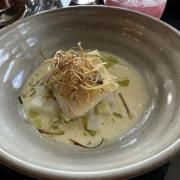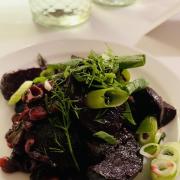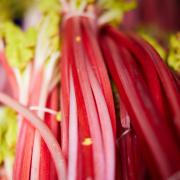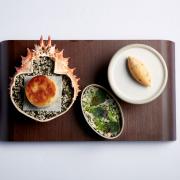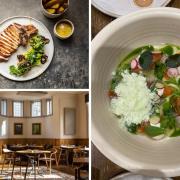Could a new traditional butcher within the city walls mean the return of the elusive York ham? Report by Jo Haywood

York ham is lightly smoked and dry-cured. Or is it unsmoked and brined? It should definitely be deep red and hung for months though. But, then again, maybe a delicate pink and five weeks of curing is the way to go. At least we can all agree that it should be very thinly sliced and served with madeira sauce – or thickly sliced and served with sweet onion chutney.
I’m afraid we’re going to have to agree to disagree on this one because, frankly, no one really knows precisely what a York ham is. There’s no recipe, the few producers who actually make it all use different methods and techniques and there are many and varied versions of its history, depending on who you ask and whether you believe their colourful tale (many of which Hans Christian Andersen would be proud of).
‘Some people think the Vikings brought it with them as part of their preserved meat store, while others say it was originally smoked over the wood chips when York Minster was being built,’ said butcher Anthony Sterne. ‘Who knows what the truth is? All I know is that our York ham is dry-cured for about five weeks and is quite salty with a pleasant dry texture.’
But is it boiled or roasted (another thorny subject much discussed in York’s cobbled snickelways on a Friday night after the pubs have shut)?

‘That’s another thing no one can agree on. We boil ours and then give it a quick roast to finish it off. It’s all about experimentation at this stage though. We’re nearly there, but there’s still a bit of work to do.’
Anthony is confident his York ham will be available by the summer. In the meantime, locals and visitors have myriad other savoury temptations to try in his new shop – Appleton’s – on Lendal, just a few steps away from the city’s historic Mansion House and Guildhall.
It’s a traditional pork butchers shop, offering handmade pork pies (a favourite of Prince Charles apparently), cured ham, sausage rolls, faggots, charcuterie, rillettes and pate. But it’s not exclusively porcine. There are steak pies, freshly baked on site, and, for those seeking a culinary adventure, ox tongue, pickled, boiled and hand-pressed using the same methods used by the original Appleton family dating back to 1867.
The new shop, which opened in October, has been designed to reflect its traditional Yorkshire heritage, with specially commissioned stained glass, etched mirrors, classic blackboards and straw hats for the staff (don’t laugh, they look very smart indeed).
Anthony and his business partner bought Appleton’s six years ago, taking over its shops in Ripon and Wetherby and maintaining its hard-won reputation for quality, fresh, handmade produce.
Roger Gaunt, the previous owner whose family had run it for three generations, wanted to retire and was looking for a safe – and capable – pair of hands to take it on. As the son of a farmer and butcher who had ‘worked with meat since I was a kid’, Anthony was the ideal choice. Although the loyal army of Appleton’s customers took a bit of convincing.
‘For the first couple of weeks, people insisted we’d changed the pork pie recipe,’ he said. ‘People literally queued round the block for them every day, so why would we change a thing? We had the same staff making the same pies in the same way using the same recipe. Thankfully, the customers kept on coming though, even if it took them a while to get used to the “new” recipe.’
York is part of a fresh tranche of Appleton’s shops, soon to be followed by Knaresborough and Boroughbridge, bringing traditional butchery back within the city walls for the first time since Scott’s Butchers closed in High Petergate in 2008 after 130 years of service.
Scott’s was something of an institution in York, famous for its York ham, bacon and sausages, attracting pork pilgrims from across the county (and beyond) in much the same way that Bettys draws cake-loving crowds in search of fondant fancies and fat rascals.
Appleton’s now aims to play a similar role in the city’s strong – and still buoyant – food scene, adding the heady scent of its fresh, handmade pork pies to the smorgasbord of treats already on offer.
‘They’re definitely our best-sellers,’ said Anthony. ‘I’ve made pastry all my working life, but when Roger first showed me the Appleton’s way, it was completely different to anything I’d seen before. I’m not going to give the game away too much, but the way the water is added is very unusual and really shouldn’t work. But it does, every time.’
The hot water crust is made using a light flour so it’s not too tough and glutenous. Most pork pies are made with a strong flour to keep them upright and leak-proof for a few days. But, as Appleton’s pies usually sell out within hours and are eaten on the day (if not on the doorstep, straight from the paper bag), a heavy crust is not necessary.
‘We use our own special seasoning for the meat, full of herbs and spices,’ said Anthony, nimbly avoiding going into too much detail. ‘We keep it quite coarse, but it stays together and isn’t crumbly. And it’s a proper pink pie, which is very much in-keeping with Yorkshire tradition.’
While the pie might be pink, the pigs are white – traditional large whites, once commonly known as ‘the Yorkshire pig’. Anthony recently invested in his own sounder of large whites to produce home-reared pork products, much to the delight of customers who say the care given to the animals is reflected in the flavour.
‘Commercially-reared pork has virtually no fat in it anymore because of the trend for low fat food,’ said Anthony. ‘Thankfully, that trend seems to be on its way out because if you want flavour you need fat. Meat with no fat is like eating cardboard.
‘Our Yorkshire pigs have a good layer of fat. And they’re also hardy, friendly and have really lovely personalities. Winston Churchill said: “Dogs looks up to us. Cats look down on us. Pigs treat us as equals”. That’s what our pigs do. They look you straight in the eye.’




